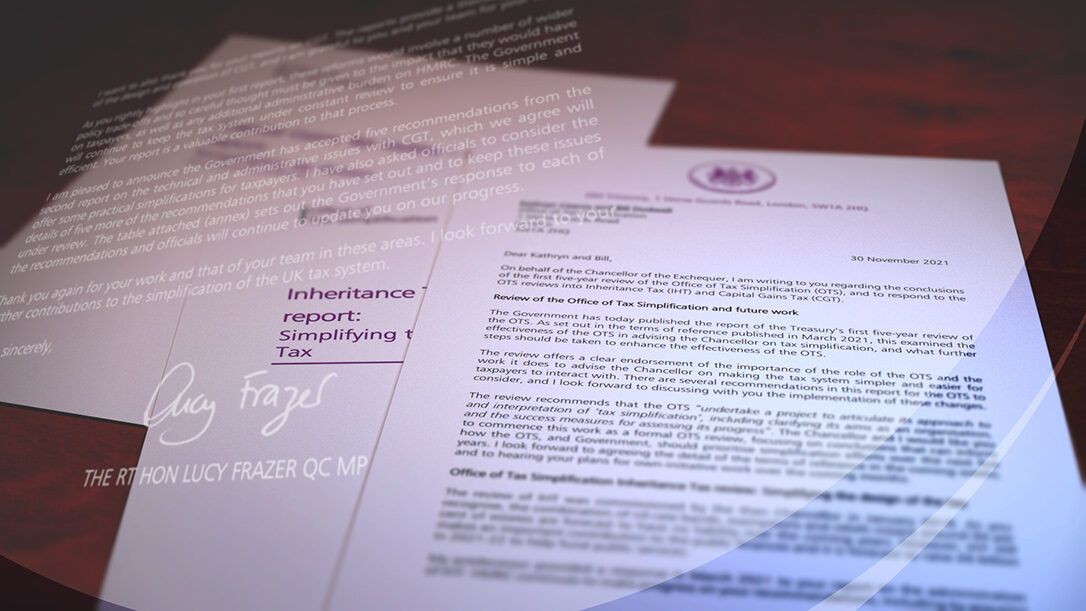In a move that went largely unnoticed, late last year the government rejected the majority of proposed changes to Capital Gains Tax and Inheritance Tax recommended by the Office of Tax Simplification.
The government’s decision to reject all but a few minor technical recommendations came in spite of the fact that it was the government itself that asked the Office of Tax Simplification (OTS) to carry out the reviews.
The response will come as welcome news to anyone concerned that the Chancellor may have used the reports as an opportunity to raise additional taxes while seeking to repair the country’s finances. However, there remain reasons to be vigilant when considering your tax circumstances.
Now and in the final quarter of the 2021/22 tax year, it could be a good time for people to reassess their position vis-à-vis these two taxes, which between them are predicted to rise more than £27bn in 2026-27. This is almost double the £15bn expected for 2021-22 and primarily explained by increases in asset prices, accentuated by higher inflation and the freezing of allowances.
Capital Gains Tax (CGT) – Main recommendations
In July 2020, The Chancellor of the Exchequer Rishi Sunak asked the OTS to review the CGT regime. The main recommendations of the OTS report, focused on the policy design and principles underpinning the tax published in November 2020, were;
- The rates of CGT and Income Tax should be “more closely aligned”. HMRC (2019) estimated that around £14bn in additional tax revenue could be raised by this change.
- The government should consider reducing the “relatively high” allowance, referring to the £12,300 Annual Exempt Amount.
Interaction with Inheritance Tax
Where a relief or exemption from Inheritance Tax (IHT) applies, the OTS recommended removing the CGT uplift on death. This uplift currently allows an estate’s beneficiaries to inherit an asset based on its value at the date of death. However, the OTS recommendation would have instead put the asset at the price the deceased person paid for it and if implemented, would have seen CGT bills increase.
The OTS also asked the government to consider rebasing all assets, “perhaps to the year 2000.”
Inheritance Tax – Main recommendations
The key IHT recommendations of the second OTS report published in July 2019, were;
- A single personal gift allowance, with an increased lower threshold for small gifts (£250 per person in 2021/22 tax year).
- A higher personal gift allowance (£3,000 in 2021/22 tax year).
- Reduce the IHT seven-year gifting rule to five years.
- Abolish the taper relief rate of Inheritance Tax. This relief reduces the rate of IHT on gifts made more than three years before death, but the OTS believes is widely misunderstood.

What are the implications of the government rejecting the OTS recommendations?
Capital Gains Tax
Rejecting the OTS recommendations on CGT means that many of the concerns about higher CGT bills can be allayed, at least for the moment. As it is, even without accepting the OTS recommendations, the Office for Budget Responsibility (OBR) forecasts that receipts from CGT will more than double from £9.2bn in 2021-22 to £19.7bn in 2026-27.
Ahead of the next tax year, clients may wish to consult with their Courtiers Adviser on how to make full use of the £12,300 Annual Exempt Amount, as well as on the optimum time to pass on their assets. In many instances, as the OTS acknowledges in its report, it will continue to be financially beneficial to hold on to assets until death rather than give them away during your life.
Tax planning which takes into account the relatively low rates of CGT compared with other taxes will continue to prove valuable. The maximum CGT tax rate (on residential property) for a higher or additional rate taxpayer is 28%, compared to 40% and 45% for higher and additional rate income taxpayers respectively.
Inheritance Tax
Agreeing to the OTS proposals arguably would have led to a simpler and more generous IHT tax regime, with only a marginal difference in tax take.
The freezing of the nil rate band and the residence nil rate bands until April 2026 (currently £325,000 and £175,000 respectively for individuals), together with rises in the value of assets, such as house prices, shares and household savings (all of which inflate the value of estates) reinforces the need for Inheritance Tax planning. In October, the OBR forecasted that receipts from IHT will increase from £5.4bn in 2020-21 to £7.6bn in 2026-27.
Although the OTS regards the rules on gifting to be complex, spending some time understanding their intricacies could prove beneficial, both by reducing the value of your estate and by helping your loved ones, such as with their living costs while you are alive.
To help the person who deals with your estate discharge their duties, you will continue to need to keep records of the gifts you’ve given going back seven years.
In addition to making full use of the £3,000 annual gift exemption and £250 per person small gifts exemption, one often underused area is what HMRC calls ‘normal expenditure out of income’. This allows you to make regular payments out of your income to help with another person’s living costs. The big advantage is that there is no limit on how much you can give tax free, as long as you can afford the payments after meeting your usual living costs and you pay from your regular monthly income.
Conclusion
Although the government has rejected all significant recommendations from the OTS and its proposals, this doesn’t mean changes along these or similar lines won’t be introduced in the future. Even without significant changes, as receipts from both CGT and IHT are set to rise, understanding and implementing careful tax and estate planning at a suitable time becomes increasingly important.
Further reading
OTS: Capital Gains Tax Review – first report (November 2020, 135 pages)
OTS: Inheritance Tax Review – second report (July 2019, 107 pages)
Chancellor response to the Office of Tax Simplification (November 2021, 5 pages)













